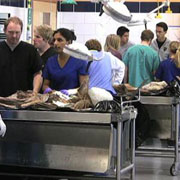VOA标准英语2011--Mini Med School Draws the Curious
时间:2019-01-14 作者:英语课 分类:VOA标准英语2011年(十月)
Mini Med School Draws the Curious
Becoming a doctor takes many years of training and tens of thousands of dollars in tuition. But anyone can get a taste of medical training, from real medical school professors, in just two months, for free, at a mini medical school in Denver.
Although medical students usually fill the lecture hall at the University of Colorado Medical Center, tonight it is ordinary people - of all ages, from all walks of life - who take their seats for an eight-week course called Mini Med School.
“Mini Medical School is the opportunity for faculty 1 to come together with the community and talk about our body, answer their questions,” says Robin 2 Michaels, one of seven medical professors who volunteer to teach the weekly, one-hour lessons.
And while no one in the mini med audience will earn a medical diploma, Michaels says they will learn plenty. “We do not dumb down the talks that we give to the community. Because the difference between your medical students and the people out in public really has most to do with their education, not their intellect.”
Diverse student group
Those eager to exercise their intellect include Barbara Stoner, who lives near the medical campus and has been curious about the course since it was first offered in 1989. “I wanted to take the mini med school 22 years ago, but the class was full.”
This year, Stoner signed up early and finally got in.
High school student Kelcie Proctor wants to become a doctor to honor her brother, who died of cancer. She heard about mini med from a teacher. “His friend works here as a professor, and he brought me the packet about this med school, and then I signed up.”
A middle school science teacher has his own reason for attending. “I’m fairly sure this mini med school is going to help me be a better teacher.”

We can't all be medical students, but ordinary people can gain a deeper understanding of the human body at the University of Colorado's Mini Med School.
A few rows away sit a mother and her 10-year-old daughter. “Because we are home schoolers, we think this is gold and so that is why we are here. We are going to fulfill 3 some of our science requirements for this year.”
In person and online
The 200-person lecture hall is nearly full by the time the mini med program director, John Cohen, strides to the podium. Hundreds of other mini med students around the state participate through a live video feed.
Cohen explains how these diverse and far-flung students can all interact during tonight’s lecture, which is on anatomy 4.
“Because the folks all around are watching on video, we will have medical students with portable microphones. If you have a question, just wave one of them down. And the people at all the other sites, email us your question.”
Then he introduces Robin Michaels, the professor who will teach tonight’s anatomy lesson.
She guides the audience through a tour of the human body. And since everyone knows how to eat, she focuses on the digestive tract 5. Using humor and a slide show, she starts her tour with saliva 6, the substance that makes a it possible to have a mouth-watering reaction.
Deeper understanding of human body
Michaels moves on to talk about the stomach, pancreas and small intestine 7. This is what she does at the real medical school except, instead of presenting a slideshow, she guides medical students as they dissect 8 human cadavers 9 donated to the medical school while the person was living.
There are no such powerful learning tools for the mini med school audience, but tonight’s lecture is still a realistic taste of what medical school might be like.
Afterwards, a 10-year old student says she’s eager to learn even more. “I just, like, you know, it’s your own body and you should know what’s going on inside.”
Michaels agrees that it’s important that each of us knows how our body works. “We all are confronted with disease. We all are confronted with death and dying. It’s how we approach that that our knowledge base is really important. Can we help educate the community is really what mini med is all about.”
Over the past two decades, more than 17,000 people have attended Mini Med School, making it the most popular course offered by the University of Colorado School of Medicine. It has inspired nearly 100 similar programs around the world, including in Canada, Germany and Ireland.
And there are plans now for a Mini Med II, an advanced program for mini med graduates which will launch in 2012.
- He has a great faculty for learning foreign languages.他有学习外语的天赋。
- He has the faculty of saying the right thing at the right time.他有在恰当的时候说恰当的话的才智。
- The robin is the messenger of spring.知更鸟是报春的使者。
- We knew spring was coming as we had seen a robin.我们看见了一只知更鸟,知道春天要到了。
- If you make a promise you should fulfill it.如果你许诺了,你就要履行你的诺言。
- This company should be able to fulfill our requirements.这家公司应该能够满足我们的要求。
- He found out a great deal about the anatomy of animals.在动物解剖学方面,他有过许多发现。
- The hurricane's anatomy was powerful and complex.对飓风的剖析是一项庞大而复杂的工作。
- He owns a large tract of forest.他拥有一大片森林。
- He wrote a tract on this subject.他曾对此写了一篇短文。
- He wiped a dribble of saliva from his chin.他擦掉了下巴上的几滴口水。
- Saliva dribbled from the baby's mouth.唾液从婴儿的嘴里流了出来。
- This vitamin is absorbed through the walls of the small intestine.这种维生素通过小肠壁被吸收。
- The service productivity is the function,including external efficiency,intestine efficiency and capacity efficiency.服务业的生产率是一个包含有外部效率、内部效率和能力效率的函数。
- In biology class we had to dissect a frog.上生物课时我们得解剖青蛙。
- Not everyone can dissect and digest the public information they receive.不是每个人都可以解析和消化他们得到的公共信息的。